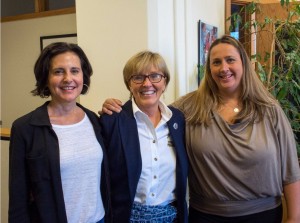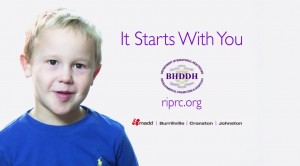Rhode Island Underage Drinking Prevention Public Service Announcements
Gaby Abbate, Mothers Against Drunk Driving
Dana DeVerna, Cranston Substance Abuse Prevention Coalition
Pattie Sweet, Tri-Town Community Action Agency, Johnston Substance Abuse Prevention Coalition, Smithfield Substance Abuse Prevention Coalition.
Anna Meehan, Rhode Island Department of Behavioral Healthcare, Developmental Disabilities, and Hospitals
Prevention Focus: Underage Drinking
In this interview, Gaby Abbate, Pattie Sweet, Dana DeVerna, and Anna Meehan discuss the creation of the Rhode Island Underage Drinking Prevention Public Service Announcements.
 What was the motivation for developing these videos? Who was involved?
What was the motivation for developing these videos? Who was involved?
The Substance Abuse and Mental Health Services Administration (SAMHSA) contacted the Rhode Island Department of Behavioral Healthcare, Developmental Disabilities, and Hospitals (BHDDH) with a funding opportunity to work on a prevention-related video-project of the community’s choosing. The timeline was short—the call came in October with a December deadline. Anna Meehan, from BHDDH, quickly got together with Gaby Abbate, from Mothers Against Drunk Driving, and the two reached out to some active Rhode Island prevention providers. Two of those providers responded quickly and enthusiastically; Dana DeVerna, from Cranston Substance Abuse Prevention Coalition and Pattie Sweet, from Tri-Town Community Action Agency, the Johnston Substance Abuse Prevention Coalition, and the Smithfield Substance Abuse Prevention Coalition.
Prior to beginning the project, Anna reviewed several videos that other states had created with the support of SAMHSA. She realized that no one had focused on young children and their parents. Many had focused on teens, police officers, and professionals. But none addressed a younger population and targeted adults. Anna and Gaby saw this as an opportunity to feature a unique population in order to continue the state’s efforts to address underage drinking.
This project represents a strong example of teamwork between local, state, and federal partners. The partnership was the driving force that allowed the video to be produced within very short time constraints. It speaks to the strength of the relationships between these entities and individuals prior to the start of the project. Without these key connections and a long history of working well together, the project might not have been possible.
 Can you talk a little bit about the process of making the videos?
Can you talk a little bit about the process of making the videos?
About 15 young children and their families agreed to be a part of the filming. Their ages ranged from 5 to 10 years old. It honestly was quite an enjoyable way to spend a Saturday! We had a great community business partner, the Regency Plaza, who generously donated space for the filming as well as a comfortable environment for the children and their families to wait and relax.
The children were not given a script. This made the parents a bit nervous because they weren’t quite sure what their daughter or son might say, but we knew that the key to the success of the video would be to allow the children to speak honestly and without any rehearsal. We had created questions and prompts prior to the filming. Some examples were “My Dad taught me…”, “A Mom’s job is…”, and “I love my parents because…” When the children were asked these questions they responded without hesitation. Their responses were exactly what we were looking for.
After the filming took place, the SAMHSA folks took the footage and spent several months editing the production. We saw a couple of drafts, helped with minor details like logo placement and background colors, but were very pleased with the final product.
Why focus on parents of young children?
Parents are constantly teaching their young children about safety. Whether it’s seatbelts, electrical outlets, or poison, safety is always on a parent’s mind. They are in “safety mode” so to speak. But rarely do these parents talk with their young children about the dangers of underage drinking and substance abuse. This is unfortunate because at that point in a child’s life, their parents are their biggest source of influence. Once they start getting older, their friends and colleagues will probably become more influential, but, with the younger children, they listen most to their parents.
These parents represent a tremendous opportunity for instilling a sense of responsibility with and respect about the dangers associated with drugs and alcohol. Yet, for the most part, no one has reached out to them until now. So our goal was to maximize federal resources to fill this gap and to ignite a degree of momentum within this population.
 What’s next for these videos? What do you foresee as their impact?
What’s next for these videos? What do you foresee as their impact?
We’re planning to launch this production very soon—hopefully in coordination with the Partnership for Success, a Rhode Island specific grant aimed to enhance underage drinking prevention efforts, reduce youth marijuana use, and reduce prescription drug use. We think it’s a wonderful opportunity to remind the public of the important role parents of young children play in substance abuse prevention. We hope that parents watch the spots, hear the honesty within the voices of young children, and use it to start a discussion. More specifically, in addition to posting them online, we are also looking into having them played in Doctor’s waiting rooms and aired on the evening news.
We are also creating some complementary print material that can be customized for each community and prevention coalition and then distributed. Hopefully, people will see children that they recognize from their communities which will help drive the message home.
Anything else you’d like to share?
With this video, SAMHSA gave Rhode Island a tremendous gift. They came in, provided resources, and then gave us the creative license to do something that our communities needed. With the support of the Department of Behavioral Healthcare, Developmental Disabilities, and Hospitals, we were able to take advantage of this gift and create a true federal, state, and community partnership. At the end of the day, we were fortunate to have been given this opportunity which we’re convinced will provide yet another layer of protection for RI children and their families.
Lastly, we are also excited about the type of messaging that these videos present. Usually, so much of prevention focuses on the negative outcomes. This time around, it’s about life… kids… and a positive message. One that we hope resonates with communities and spurs families to begin having the tough conversations about substance abuse that are so crucial to our prevention efforts.

